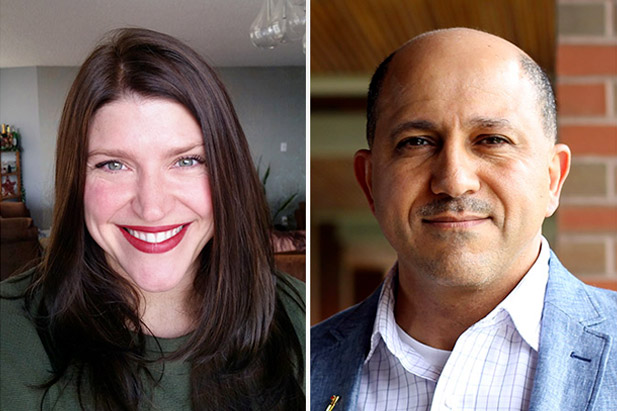University researchers share investigative insights with local community
March 6, 2017

What are the contextual factors behind the prevalence of sexual violence in society, particularly incidents involving multiple perpetrators? How can Canada build resilient energy and transportation infrastructures that are cost-effective and environmentally friendly? Complex and diverse questions to be certain.
These were among the topics examined March 2 by two of the University of Ontario Institute of Technology’s leading researchers as the Office of the Vice-President, Research, Innovation and International hosted the annual Research Excellence Award Speaker Series.
The lecture-style event featured the two recipients of the university’s 2016 Research Excellence Awards:
- Dr. Leigh Harkins, Associate Professor, Faculty of Social Science and Humanities
- Dr. Hossam Gaber, Professor, Faculty of Energy Systems and Nuclear Science
Dr. Harkins shared some of the findings of her research group on the disturbing rate of sexual violence involving more than one suspect. She explained multiple perpetrator sexual violence is more prevalent than most realize (accounting for 10 to 33 per cent of all cases). Suspects tend to be younger and more violent.
Her research explores the characteristics of sexual violence suspects and possible factors involved such as deviant sexual interest, cultural acceptability, group or processes/pressures and positions of leadership/trust. She also examines the context of environment and culture: areas such as prisons, war/combat zones, gangs, residential schools, sex trade workers, sports teams/coaches, daycares or fraternities.
She underscored the overlap between individual behaviour, inability to recognize one’s emotions, rape-supportive and victim-blaming beliefs, exposure to cultural images and messages supportive of rape, and even organizations that endorse pedophilia.
- Watch the video link of Dr. Harkins’ presentation Understanding multiple perpetrator sexual violence (begins at 7:06).
Dr. Gaber presented new approaches to plan and optimize energy mix to meet regional energy demand based on accurate modeling of energy generation, conversion and storage technologies, including fossil fuels, nuclear, renewable, gas-power, battery and flywheel-energy storage systems. He presented risk-based techniques to evaluate potential hazard scenarios and provide safety and protection layers to ensure resilient energy infrastructures, with economic and environmental considerations.
Dr. Gaber demonstrated engineering design and advanced control systems to implement adaptive interconnected micro-energy grids that can supply energy to residential and commercial facilities and transportation infrastructures.
Dr. Gaber demonstrated new energy system designs using resilient interconnected micro-energy grids to supply energy for transit networks including railway and buses. The proposed solution can support railway that runs across adjacent regions such as Oshawa, Whitby, Ajax and Pickering, providing sustainable energy supply as well as fast-charging stations to railways and electric buses in normal operations and during power outage and emergencies. His energy system design can also supply energy to surrounding communities and back to the grid with effective economic analysis to ensure highest efficiency and profit while minimizing greenhouse gas emissions.
- Watch the video link of Dr. Gaber’s presentation Towards resilient energy and transportation infrastructures (begins at 39:10).



